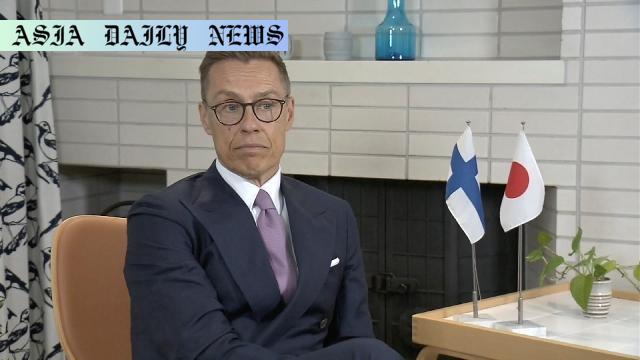Russia-Ukraine Talks: Finland’s president sees no indications of Trump stepping back from ceasefire negotiations.
Finland’s President Alexander Stubb expresses confidence in Trump’s commitment to Russia-Ukraine talks.
Stubb communicates frequently with Trump and observes no signs of him withdrawing from negotiations.
The Finnish president stresses the importance of increasing sanctions to pressure Russia.
Stubb highlights the significance of diplomatic efforts and Finland’s role as a deterrent in Northern Europe.

US-Finland Collaboration in Russia-Ukraine Ceasefire Talks
Finland’s President Alexander Stubb has voiced his confidence in President Donald Trump’s commitment to the ongoing ceasefire negotiations between Russia and Ukraine. Speaking in Tokyo during an interview with NHK, President Stubb emphasized the frequency and transparency of his dialogues with Trump. Reflecting on their regular discussions, he stated that he has “seen no indications” of Trump withdrawing from the peace negotiations at any point. Instead, the Finnish leader described Trump as motivated in his pursuit of a durable peace that would benefit all parties involved.
The focus on sustained diplomacy underscores the active role Trump has taken in urging Russian President Vladimir Putin to reconsider his stance on unconditional ceasefire proposals. Despite the challenges faced in persuading Russia to de-escalate, the U.S. administration remains focused on demonstrating the long-term economic repercussions of an extended conflict. President Stubb affirmed the alignment between Finland and the United States in amplifying this message through coordinated strategies and channels of negotiation.
Enhanced Sanctions as a Tool to Pressure Russia
President Stubb delivered a clear message on the need to reinforce economic sanctions against Russia to push Moscow toward a resolution. Given Russia’s rejection of unconditional ceasefire proposals, he argued that imposing harsher sanctions would send a definitive message regarding the cost of continuing the war. Speaking candidly, he asserted that the most effective way forward is to make “the alternative cost of Russia to continue the war too high.” Such measures, he argued, escalate the economic strain on Russia, fostering a more conducive environment for peace negotiations.
The role played by Finland, as part of the larger international framework advocating for Ukraine, includes its geographical and strategic position in Northern Europe. While Finland does not intend to send troops on the ground, the country continues to prioritize a deterrent role against Russian aggression. By bolstering NATO’s presence and diplomatic influence, Finland aims to maintain stability in the northeast of Europe.
Diplomatic Perspectives on Ceasefire
Despite the numerous challenges faced in peace negotiations, the Finnish leader remains optimistic. Referring to the collaborative talks held earlier in Washington, he emphasized Trump’s genuine interest in reaching a peace agreement. Both leaders, amidst policy dialogues, have sought to implement measures that prioritize a stable global economy. Notably, their March meeting combined policy discussions with informal opportunities to strengthen ties, including a game of golf.
Stubb cautioned, however, that achieving tangible progress will require patience and unified effort across Western allies. He suggested that Putin will only reconsider his approach to peace talks when economic and military pressures make the status quo unsustainable. Finland’s role, he noted, provides critical support to broader NATO efforts. Ultimately, a stable resolution, according to Stubb, will depend on firm and calculated initiatives from leaders such as Trump and allied Western nations.



Commentary
The Importance of Diplomatic Consistency
The ongoing commitment by global leaders, particularly Finland’s President Alexander Stubb and U.S. President Donald Trump, to broker a ceasefire in the Russia-Ukraine conflict highlights the intricate balance of diplomacy and hardline strategies. In today’s interconnected world, conflicts like this affect not just the nations directly involved but also the global economy and geopolitical stability. It is reassuring to see leaders emphasizing consistent dialogue and engagement, even when success is not guaranteed. Stubb’s statements reflect a hopeful yet pragmatic approach, trusting in diplomacy’s power while acknowledging the necessity of fiscal pressures on Russia.
Sanctions: An Effective Deterrent?
Economic sanctions remain a powerful tool in modern diplomacy, often seen as an alternative to direct military involvement. President Stubb’s call to strengthen sanctions against Russia is a clear acknowledgment of their effectiveness in driving behavioral change. By making the war economically unsustainable for Russia, Western countries aim to influence its leadership to pursue peace. Nonetheless, sanctions also test the patience and resilience of global actors, from financial markets to ordinary citizens who may bear the consequences indirectly. A thoughtful balance is critical to ensure the costs of sanctions do not outweigh their intended benefits.
Finland’s Strategic Northern Role
Finland’s role in the Russia-Ukraine conflict underscores the significance of geographical positioning. As a neighboring country to Russia, Finland is uniquely positioned to act as both a deterrent and a voice of reason in this complex situation. While the decision not to deploy troops aligns with global calls for restraint, Finland’s emphasis on supporting NATO efforts adds another layer of security in northeastern Europe. Ultimately, Finland’s dual role as a diplomat and deterrent highlights the evolving nature of modern conflict resolution.